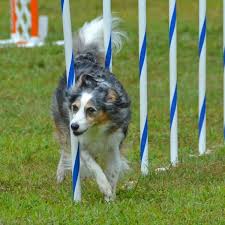The Benefits of Enrolling in Dog Training Courses
Training your dog is not just about teaching them commands; it’s about building a strong bond based on trust and communication. Dog training courses offer a structured and effective way to enhance your relationship with your furry companion while addressing behavioural issues and improving their overall well-being.
Key Benefits of Dog Training Courses:
- Improved Obedience: Through consistent training, dogs learn to respond to commands, making daily interactions smoother and more enjoyable.
- Behavioural Correction: Professional trainers can help address common behavioural problems such as aggression, anxiety, or excessive barking.
- Socialisation: Dog training courses provide opportunities for your pet to interact with other dogs in a controlled environment, promoting social skills and confidence.
- Mental Stimulation: Engaging in training activities challenges your dog’s mind and prevents boredom, reducing the likelihood of destructive behaviours.
- Bonding Experience: Training sessions strengthen the bond between you and your dog through positive reinforcement and mutual understanding.
Choosing the Right Dog Training Course:
When selecting a dog training course, consider the following factors:
- Instructor Expertise: Look for certified trainers with experience in positive reinforcement techniques.
- Training Methods: Ensure that the course aligns with your training philosophy and focuses on reward-based methods.
- Class Size: Smaller classes allow for individualised attention and better interaction between participants.
- Fitness Level: Consider the physical requirements of the course for both you and your dog.
- Affordability: Compare prices and evaluate the value offered by different courses before making a decision.
In conclusion, investing time and effort in dog training courses can lead to a happier, healthier relationship with your canine companion. Whether you are looking to address specific behavioural issues or simply enhance your pet’s skills, enrolling in a reputable training programme can make a significant difference in both you and your dog’s lives.
Key Insights into Dog Training Courses: Levels, Qualifications, and Effective Training Methods
- How many levels are there in dog training?
- What qualifications do you need to be a dog trainer?
- What are the best types of training for dogs?
- What is the best dog training qualification?
- What qualifications do I need to be a dog trainer?
How many levels are there in dog training?
In dog training courses, the number of levels can vary depending on the training programme and the specific goals of the course. Typically, dog training courses are structured into multiple levels to cater to dogs of different skill levels and behaviours. Commonly, you may find beginner, intermediate, and advanced levels in dog training programmes. Each level builds upon the skills learned in the previous stage, gradually increasing in complexity and challenges to further enhance the dog’s obedience and behaviour. The progression through these levels allows for a comprehensive training experience that addresses various aspects of a dog’s development, from basic commands to advanced tasks and behaviours.
What qualifications do you need to be a dog trainer?
To become a professional dog trainer, certain qualifications and skills are essential. While formal qualifications are not always required, obtaining certifications from reputable training organisations can enhance your credibility and expertise in the field. In addition to theoretical knowledge of canine behaviour and learning principles, practical experience working with dogs of various breeds and temperaments is invaluable. Strong communication skills, patience, empathy, and a genuine passion for helping both dogs and their owners are also vital qualities for a successful dog trainer. Continuous learning and staying updated on the latest training techniques are crucial to providing effective and ethical training services that benefit both dogs and their human companions.
What are the best types of training for dogs?
When considering the best types of training for dogs, it is essential to focus on methods that prioritise positive reinforcement and reward-based techniques. Reward-based training, such as clicker training or treat-based training, has been proven to be effective in shaping desired behaviours while strengthening the bond between dog and owner. Additionally, obedience training that incorporates consistency, patience, and clear communication can help dogs learn commands and improve their overall behaviour. Tailoring the training approach to suit the individual needs and personality of the dog is key to achieving successful results in any type of dog training course.
What is the best dog training qualification?
When seeking the best dog training qualification, it is essential to consider accreditation, reputation, and methodology. The most reputable qualifications often come from recognised organisations that adhere to ethical training practices and promote positive reinforcement techniques. Look for certifications that demonstrate a comprehensive understanding of canine behaviour, effective training methods, and hands-on experience. Additionally, feedback from past students and industry professionals can provide valuable insights into the quality of a particular qualification programme. Ultimately, the best dog training qualification is one that equips you with the knowledge and skills needed to train dogs effectively while prioritising their well-being and building a strong bond based on trust and respect.
What qualifications do I need to be a dog trainer?
To become a successful dog trainer, having a genuine passion for working with animals is essential. While formal qualifications are not always mandatory, obtaining certification from recognised training organisations can greatly enhance your credibility and expertise in the field. Many aspiring dog trainers choose to pursue courses or workshops that focus on animal behaviour, learning theory, and training techniques. Additionally, gaining hands-on experience through apprenticeships or volunteering at animal shelters can provide valuable practical skills. Ultimately, dedication, patience, and a deep understanding of canine behaviour are key qualities that can help you excel as a professional dog trainer.

